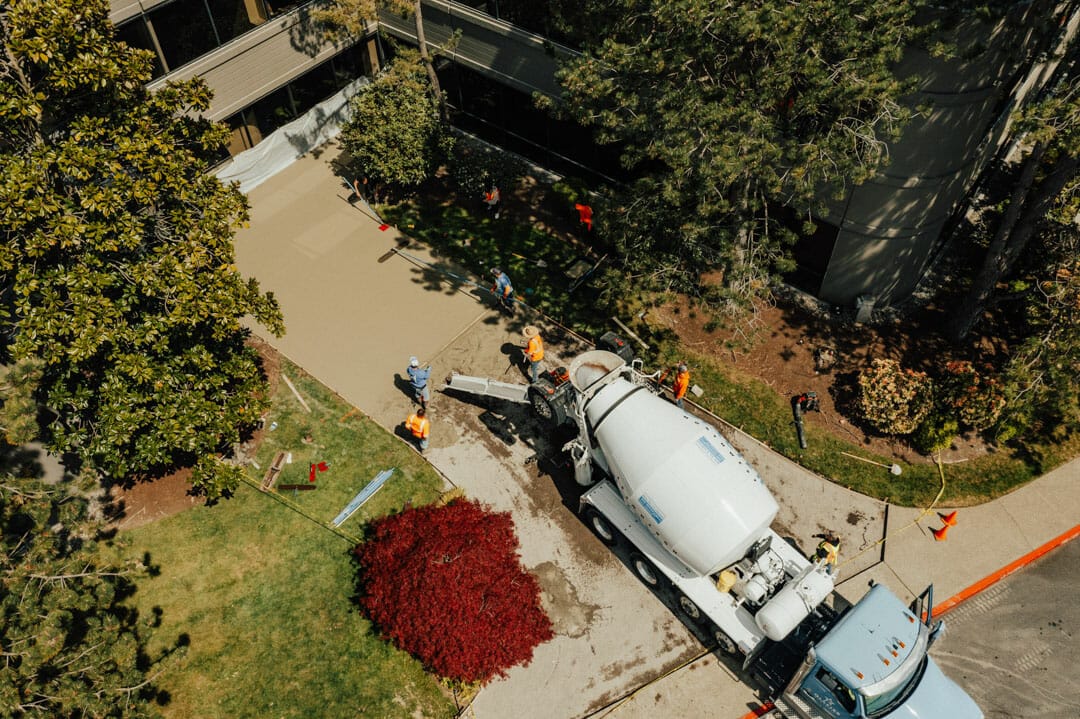In an era of growing environmental consciousness, businesses are increasingly seeking sustainable solutions in every aspect of their operations. The construction industry, with its significant environmental footprint, is no exception. Commercial property owners are recognizing the importance of adopting eco-friendly practices, and when it comes to paving, sustainable asphalt is leading the charge.
Sustainable asphalt technologies offer a compelling way to reduce your environmental impact while maintaining the durability and performance you expect from your pavement.
The Growing Importance of Sustainable Asphalt in Commercial Construction
Sustainability is no longer just a trend; it’s a core value for many businesses. Consumers are actively choosing companies that prioritize environmental responsibility. Furthermore, regulations and building codes are evolving to encourage, and in some cases mandate, the adoption of sustainable practices.
For commercial property owners, embracing sustainable asphalt and sustainable construction in general offers a multitude of benefits:
- Enhanced Brand Image: Demonstrating a commitment to environmental stewardship can attract eco-conscious customers and tenants, giving you a competitive edge.
- Reduced Operating Costs: Energy-efficient buildings and sustainable materials can lead to lower utility bills and long-term savings, positively impacting your bottom line.
- Increased Property Value: Green buildings often command higher rents and resale values, making sustainable investments financially sound.
- Improved Employee Morale: Creating a healthy and sustainable work environment can boost employee satisfaction, productivity, and attract top talent.
By embracing sustainability in your commercial property, you not only contribute to a healthier planet but also enhance your business’s overall success.
Overview of Sustainable Asphalt Technologies
The asphalt industry has made significant strides in developing sustainable solutions that minimize environmental impact without compromising performance. Here are some of the leading technologies driving asphalt sustainability:
Recycled Asphalt Pavement (RAP): RAP involves incorporating reclaimed asphalt pavement (from old roads and parking lots) into new asphalt mixes. This reduces the need for virgin materials, conserves natural resources, and diverts waste from landfills. Using RAP significantly lowers the carbon footprint of asphalt production and contributes to a circular economy.
Warm-Mix Asphalt (WMA): WMA is produced at lower temperatures than traditional hot-mix asphalt, reducing energy consumption and greenhouse gas emissions during production. It also offers improved workability and can be placed in cooler weather, extending the paving season and reducing delays.
Permeable Pavements: Permeable pavements allow stormwater to infiltrate the ground, reducing runoff and improving water quality. They can also help replenish groundwater supplies and mitigate flooding. This technology is particularly valuable in urban areas where traditional impervious surfaces contribute to stormwater management challenges.
Bio-Based Binders: Researchers are exploring the use of bio-based materials, such as vegetable oils and lignin, as alternatives to petroleum-based asphalt binders. These bio-binders can reduce reliance on fossil fuels and lower carbon emissions, further enhancing asphalt sustainability.
These sustainable asphalt technologies offer a range of environmental benefits, making them essential components of a greener approach to paving.
Environmental Benefits of Sustainable Asphalt
Adopting sustainable asphalt solutions can significantly reduce your commercial property’s environmental footprint. Here are some key benefits:
- Reduced Carbon Footprint: By using recycled materials, lowering production temperatures, and utilizing bio-based binders, sustainable asphalt helps to conserve energy and reduce greenhouse gas emissions, combating climate change.
- Improved Stormwater Management: Permeable pavements and other green infrastructure solutions can help to mitigate stormwater runoff, reducing the burden on municipal sewer systems and improving water quality. This helps protect local ecosystems and reduces the risk of flooding.
- Reduced Heat Island Effect: Lighter-colored asphalt pavements can reflect more sunlight and reduce the heat island effect, which can contribute to urban heat buildup and air pollution. This creates a more comfortable environment for pedestrians and reduces energy consumption for cooling buildings.
- Conservation of Natural Resources: Utilizing recycled materials and reducing the need for virgin aggregates helps to conserve valuable natural resources, ensuring their availability for future generations.
These environmental benefits not only contribute to a healthier planet but can also lead to financial advantages for commercial property owners.
Financial Benefits of Sustainable Asphalt
While the upfront cost of sustainable asphalt may be slightly higher in some cases, the long-term financial benefits can be significant:
- Potential Tax Incentives: Many local and state governments offer tax incentives or rebates for projects that incorporate sustainable materials and practices, including those that promote asphalt sustainability.
- Reduced Lifecycle Costs: Sustainable asphalt often has a longer lifespan and requires less maintenance than traditional asphalt, resulting in lower long-term costs. This is particularly true for high-traffic areas where durability is paramount.
- Lower Energy Bills: Permeable pavements and green roofs can help to reduce building cooling costs by mitigating the heat island effect.
- Increased Property Value: Green buildings and sustainable features can attract higher rents and resale values, making your property more desirable to tenants and investors.
By factoring in these financial benefits, sustainable asphalt can be a cost-effective choice for commercial property owners, delivering both environmental and economic returns.
How Asphalt Sustainability Can Contribute to LEED Certification
Leadership in Energy and Environmental Design (LEED) is a globally recognized green building rating system. LEED certification can enhance a building’s marketability, attract tenants, and demonstrate a commitment to sustainability.
Sustainable asphalt can contribute to several LEED credits, including:
- Sustainable Sites: Using recycled materials, reducing heat island effect, and implementing stormwater management practices can earn points in this category.
- Materials and Resources: Utilizing recycled content and locally sourced materials can contribute to credits in this category.
- Innovation: Innovative sustainable asphalt technologies, such as bio-based binders, may qualify for innovation credits.
By incorporating sustainable asphalt into your commercial property, you can increase your chances of achieving LEED certification and reaping the associated benefits, including increased property value and a positive brand image.

Sustainable Asphalt: Paving a Greener Future, Together.
Sustainable asphalt solutions offer a win-win scenario for commercial property owners. By reducing environmental impact, improving long-term cost-effectiveness, and enhancing your brand image, sustainable asphalt is a smart investment for the future. As you plan your next paving project, consider the many benefits of choosing sustainable asphalt and paving the way to a greener future for your business and the planet.
Contact NYS Enterprises for Professional Asphalt Paving
At NYS Enterprises, we take asphalt paving and compaction very seriously. After all, we are dedicated to the professional installation and maintenance of asphalt pavement and have an impressive track record to prove it. Don’t hesitate to contact us today for more information about our asphalt paving solutions!





